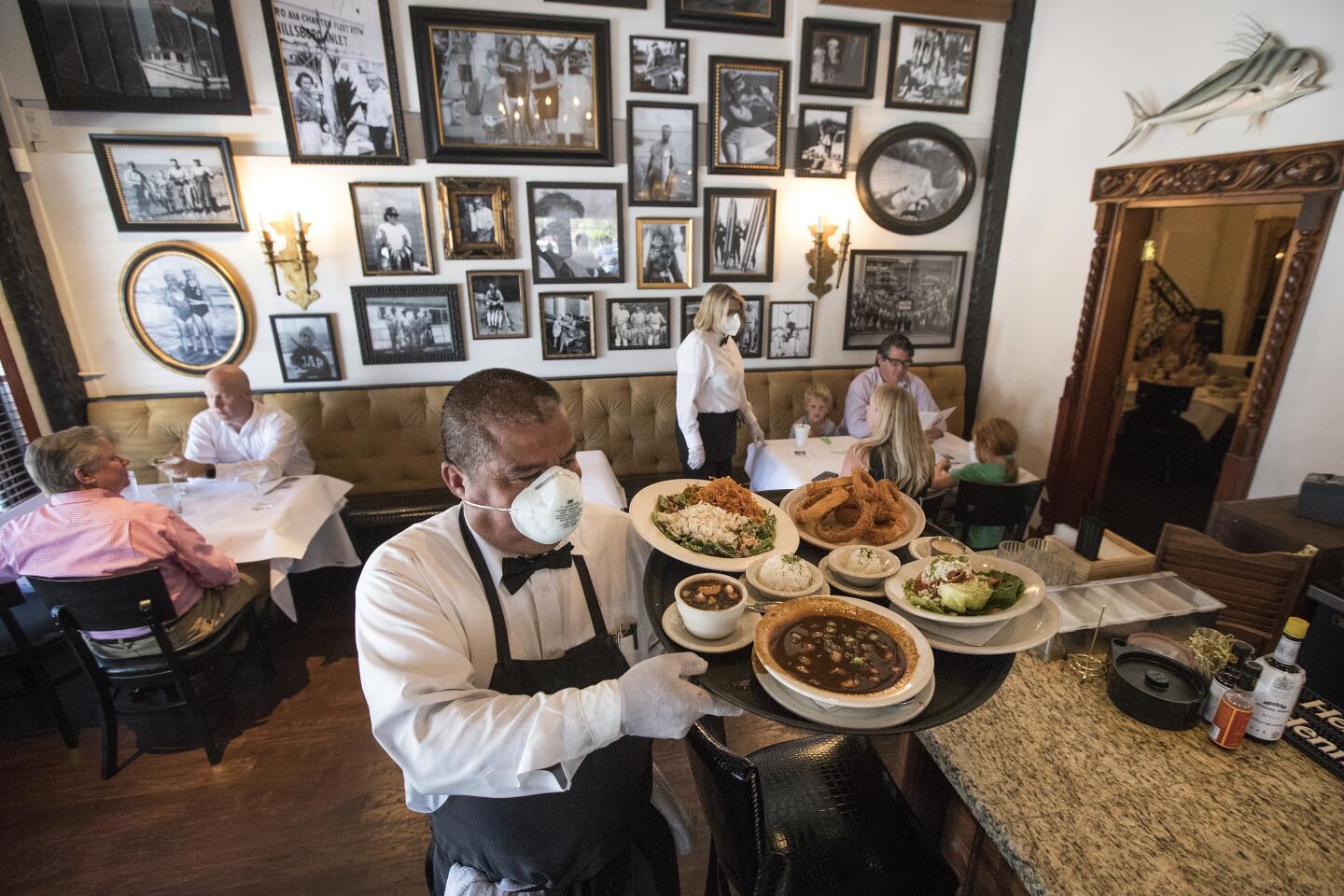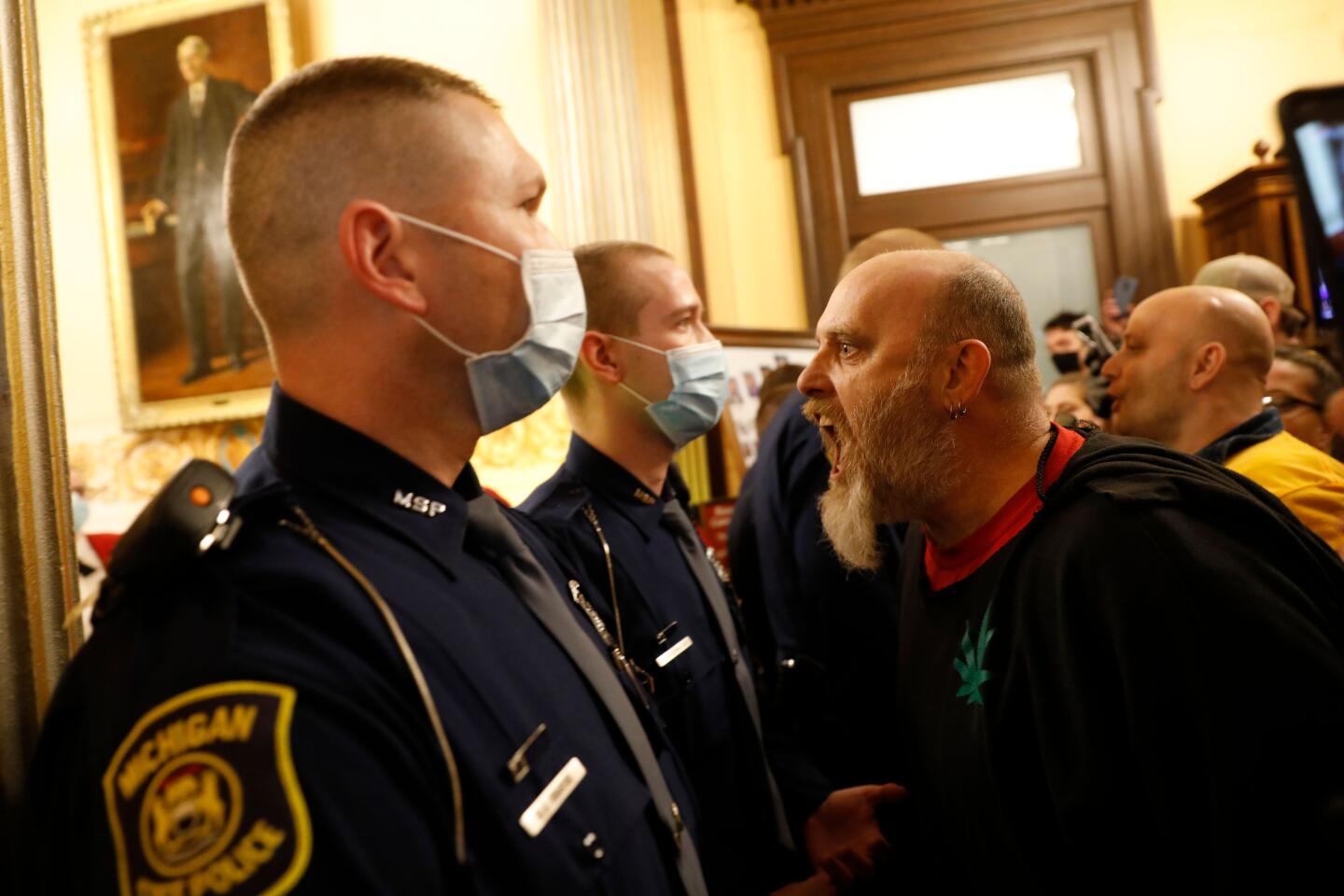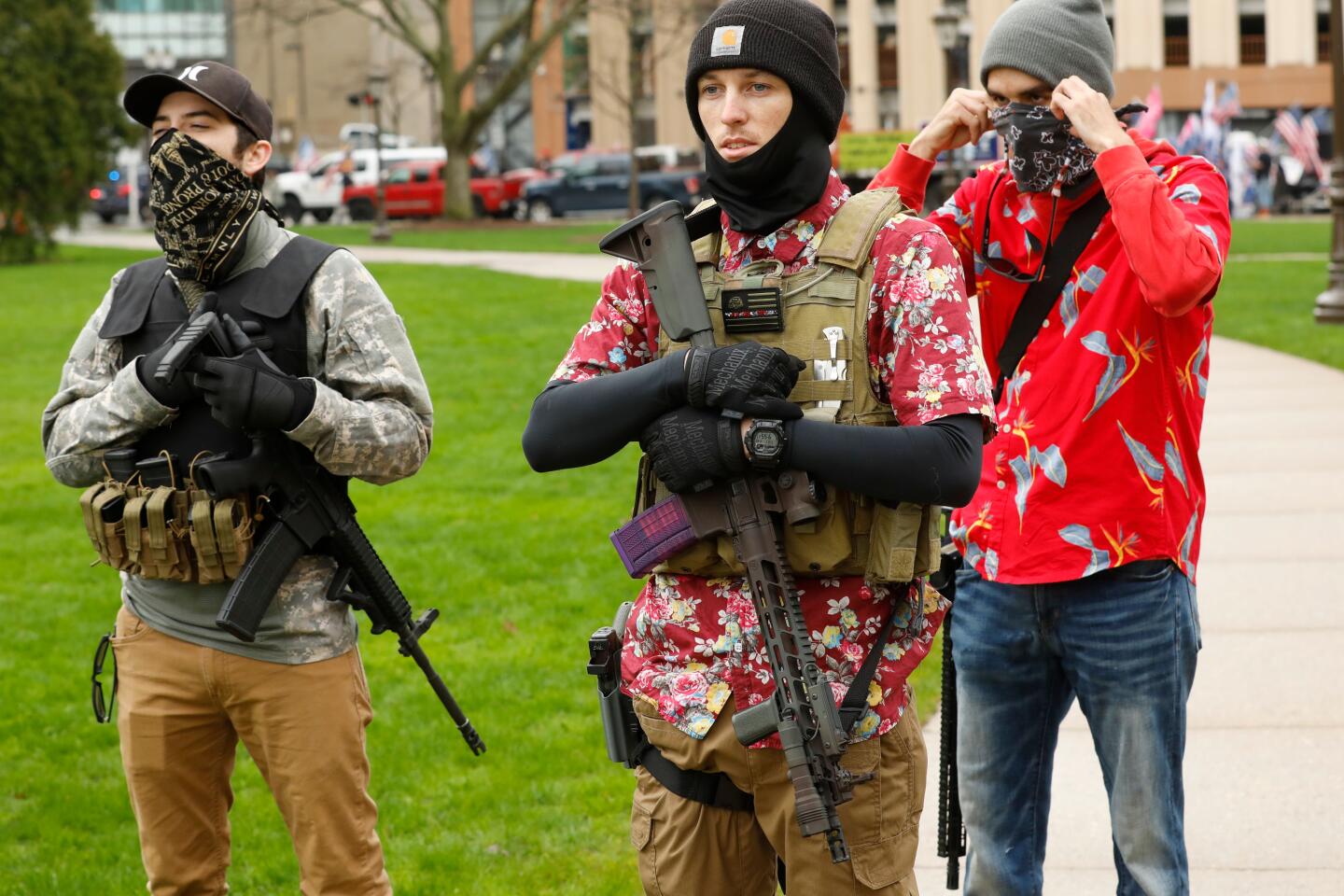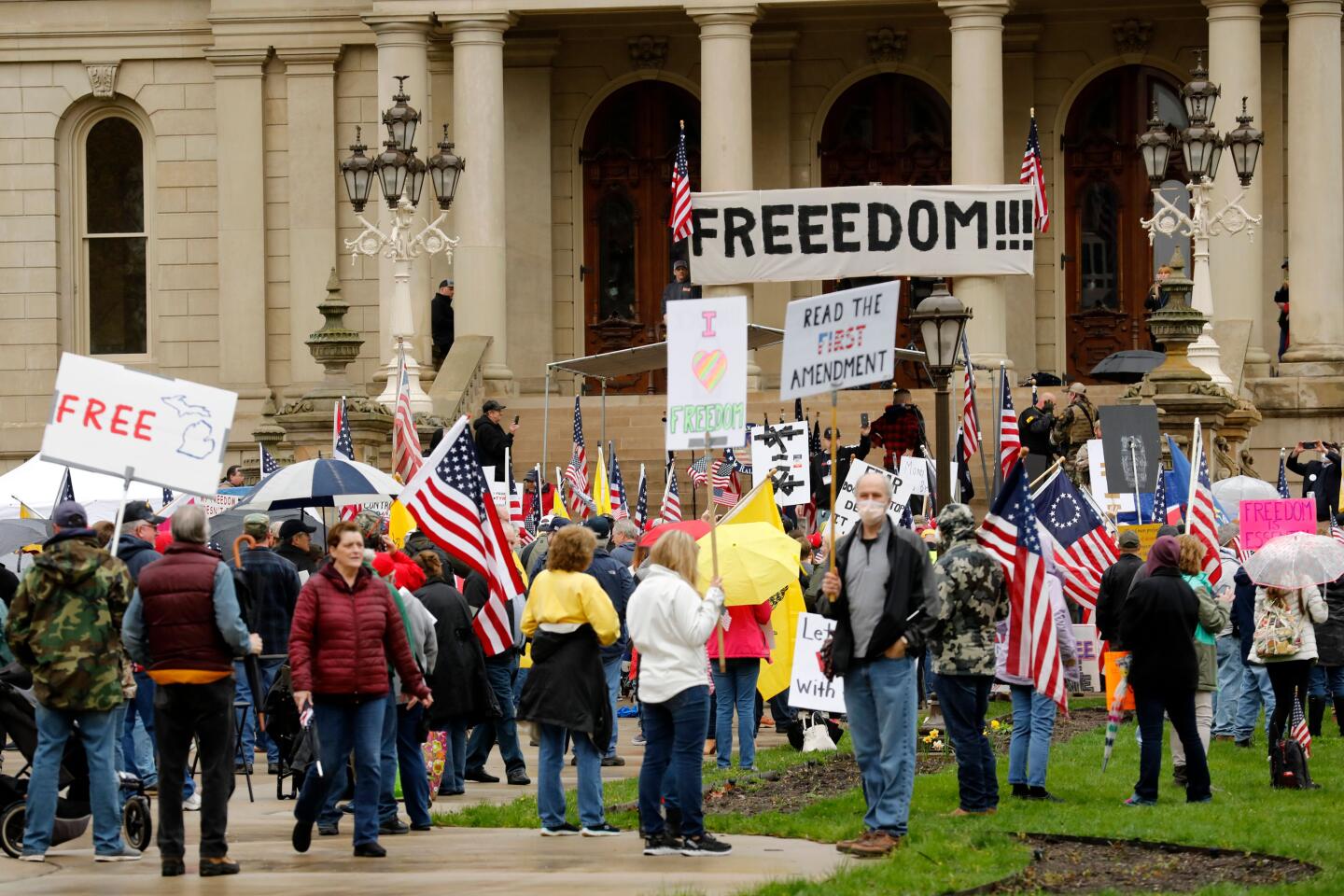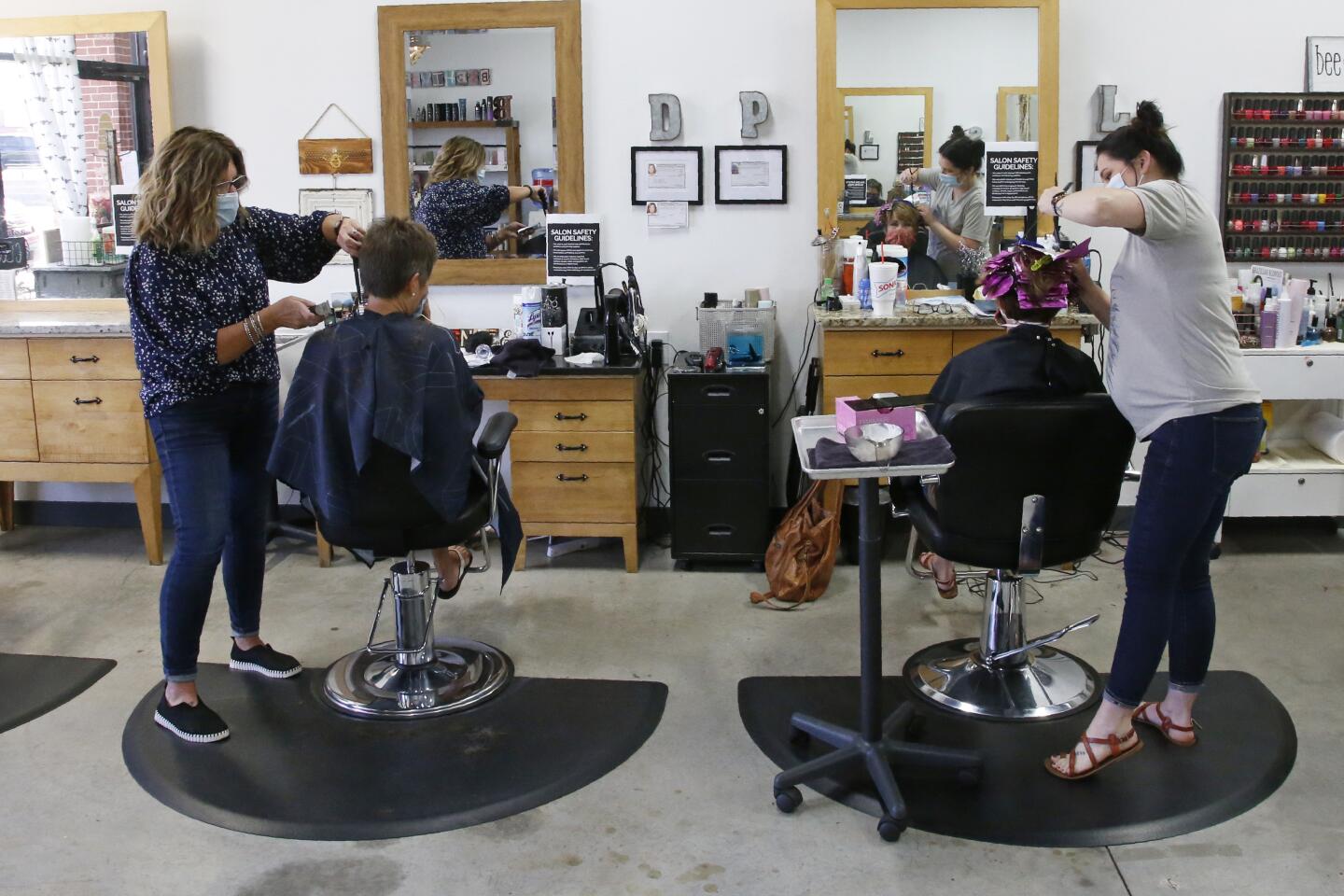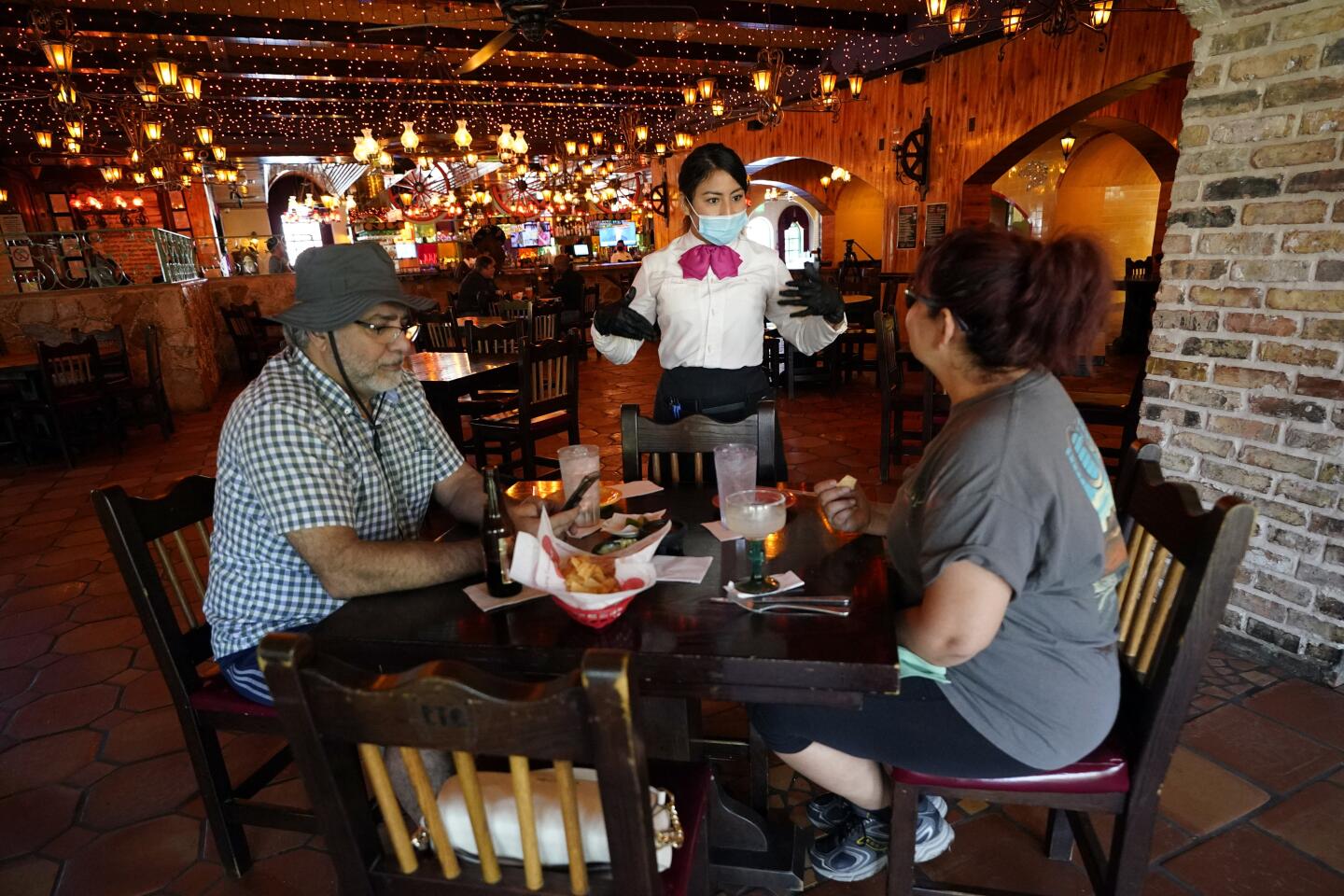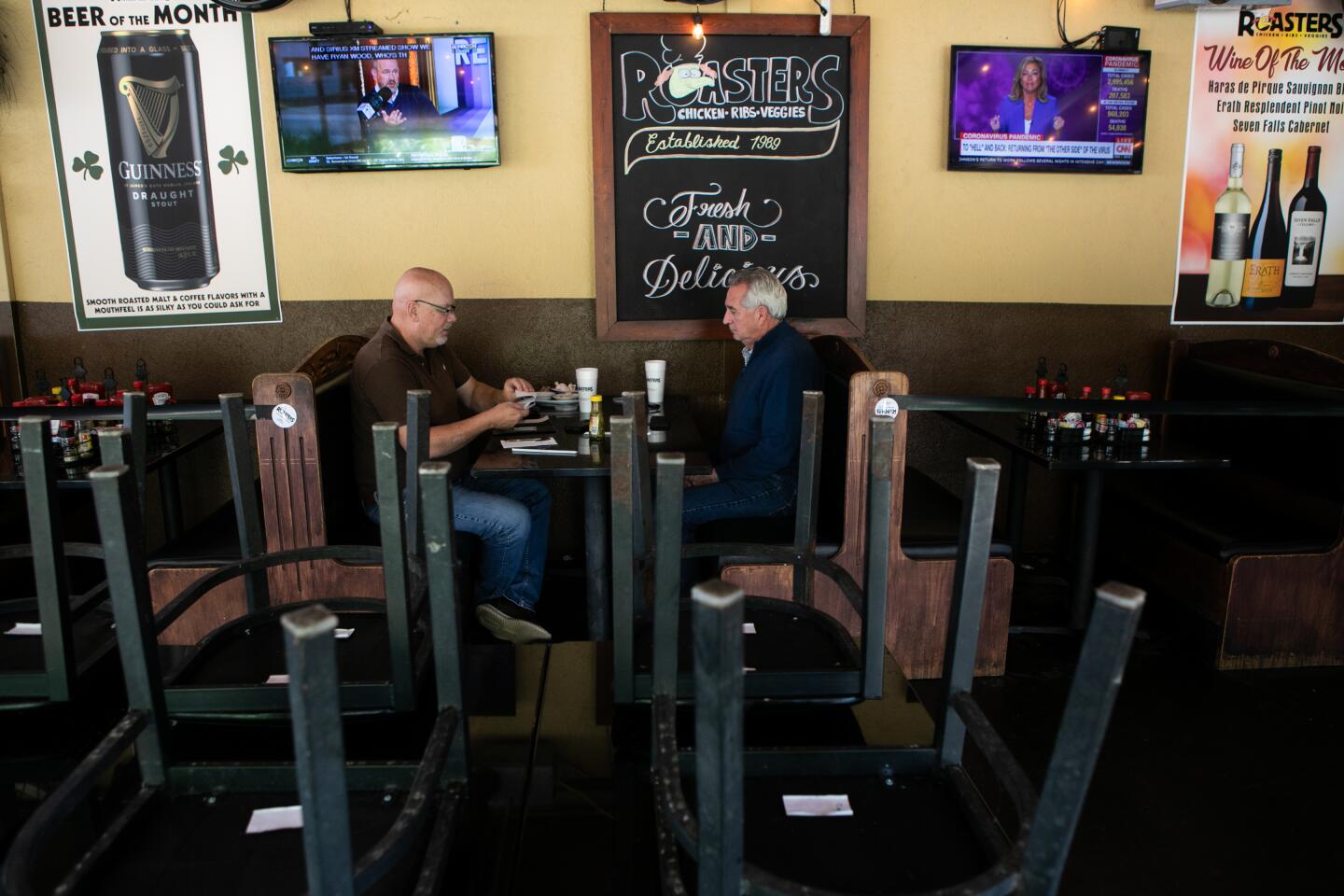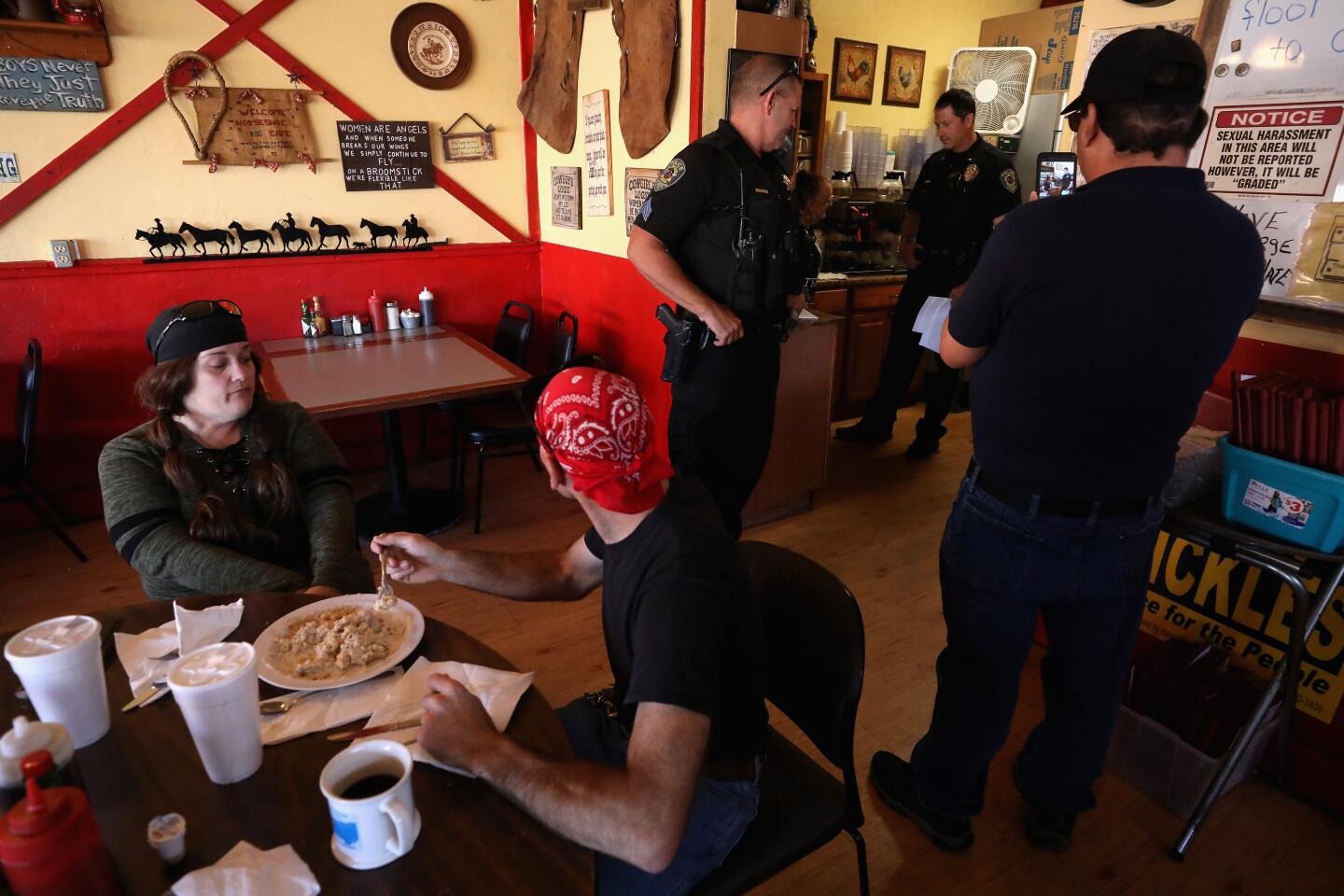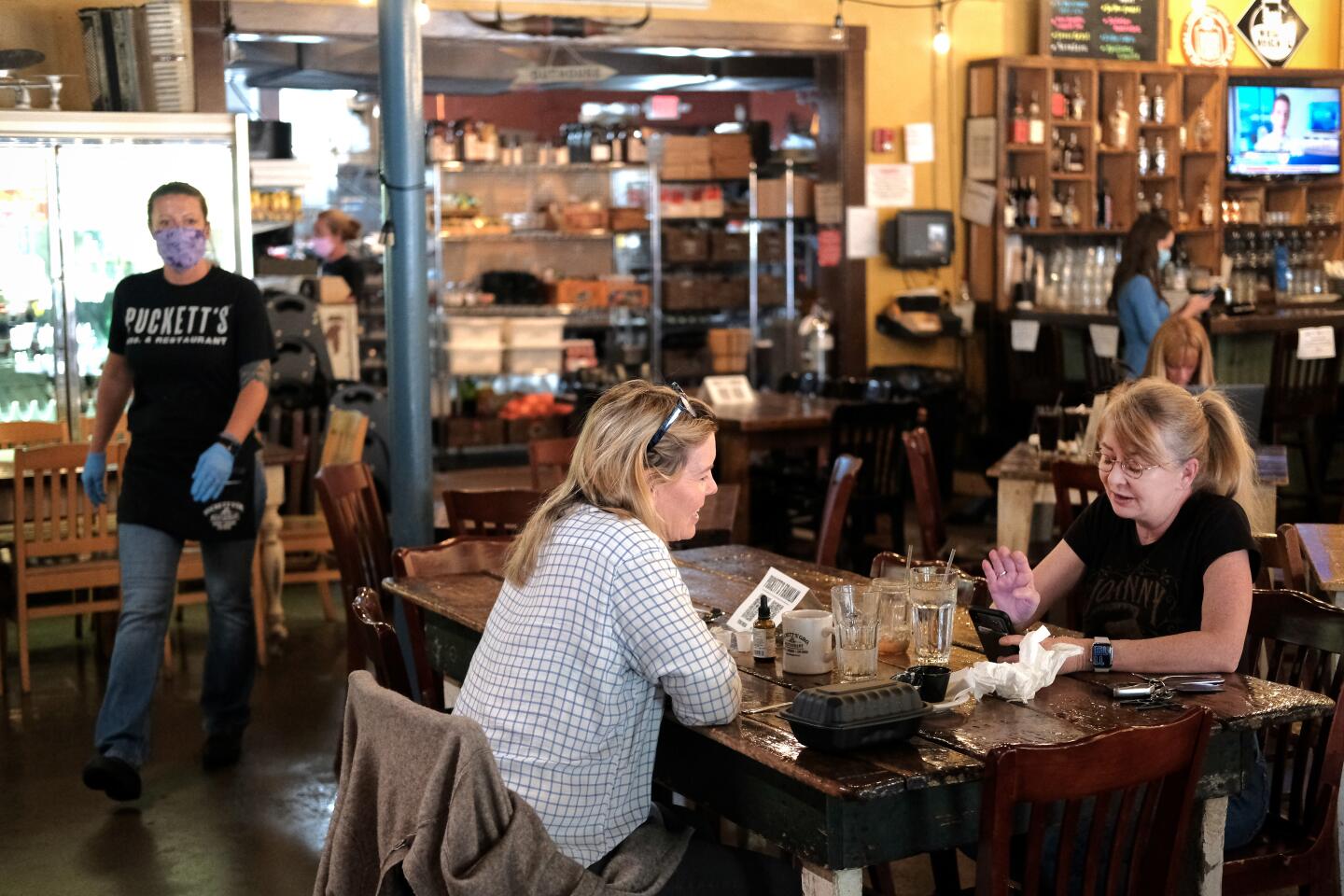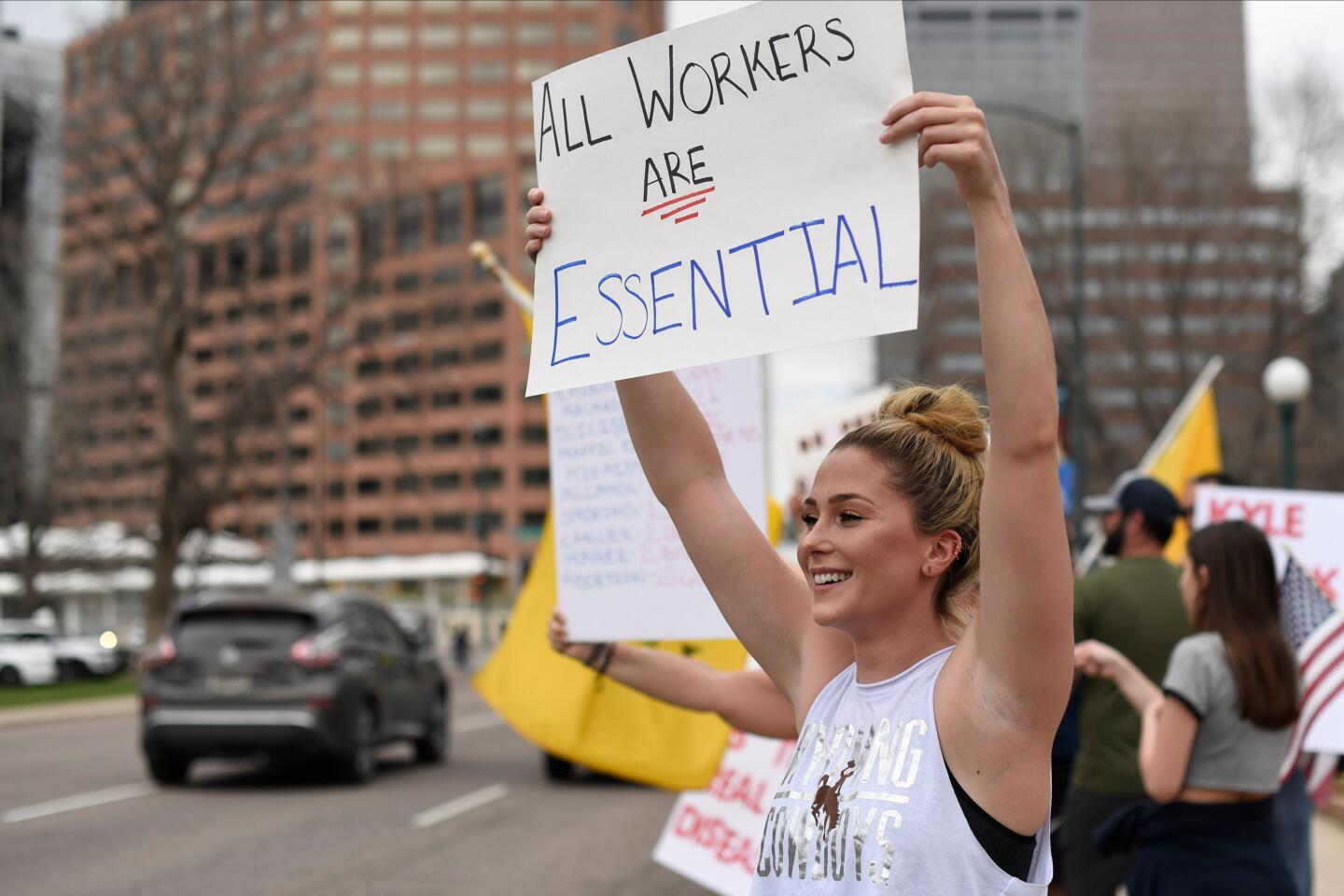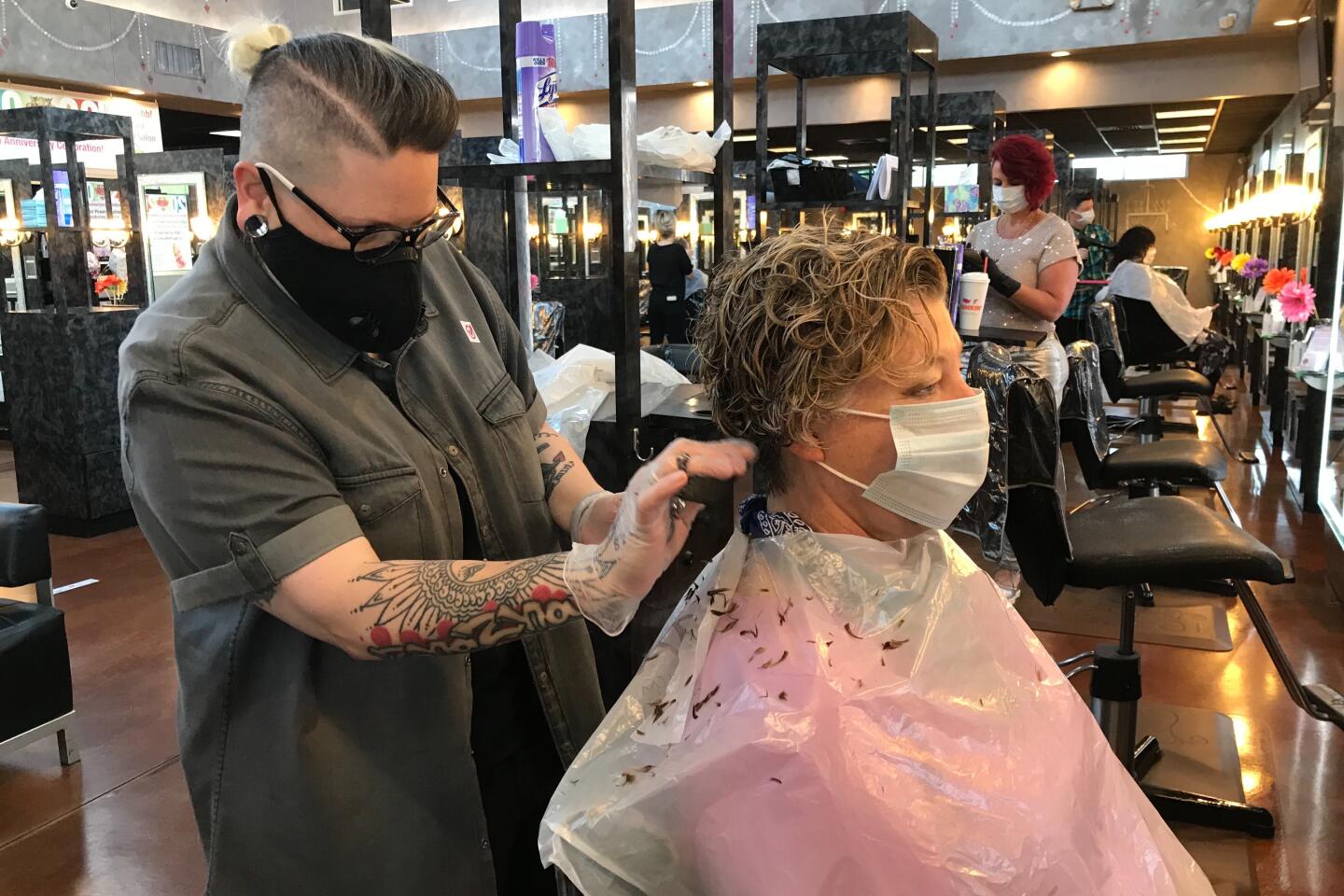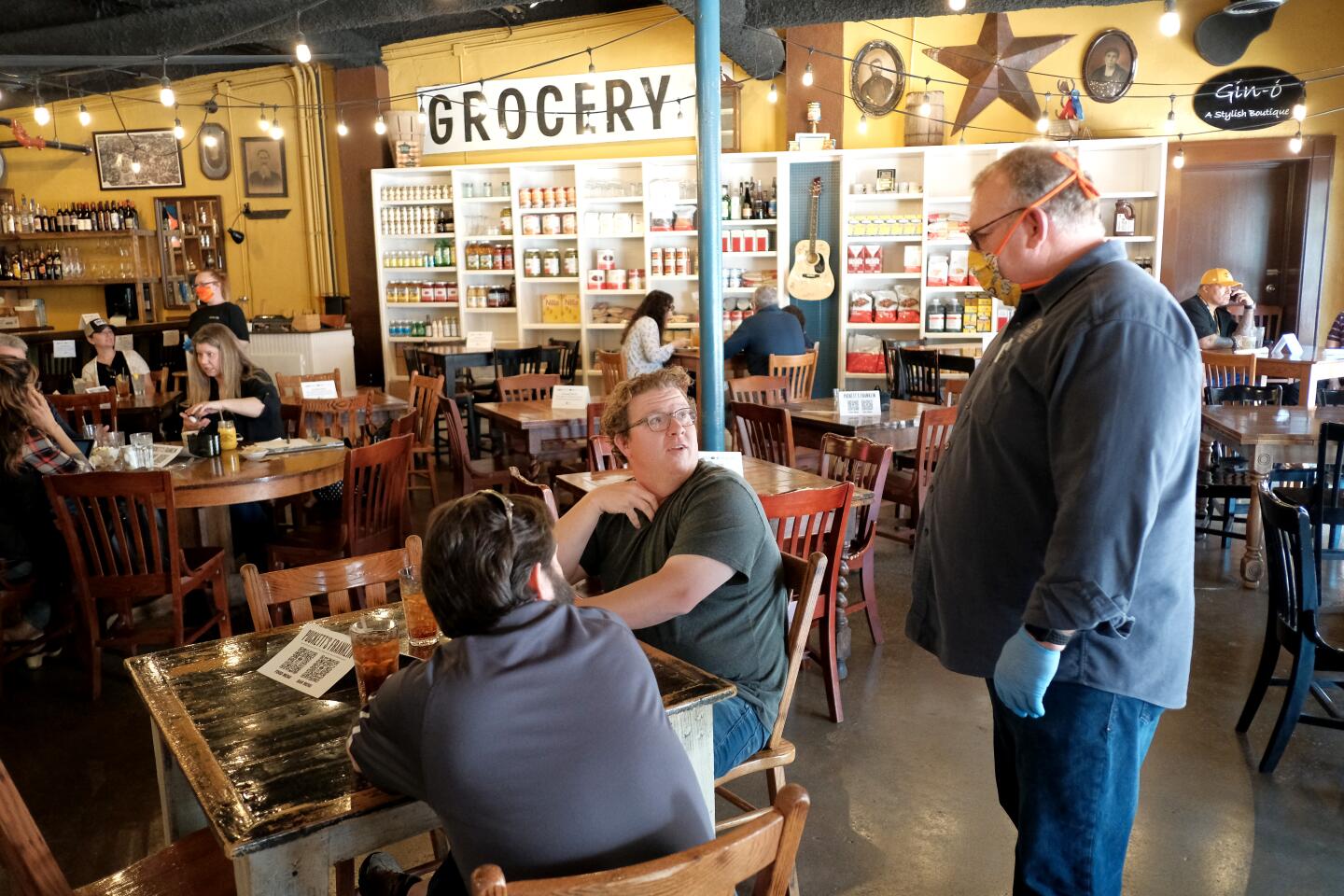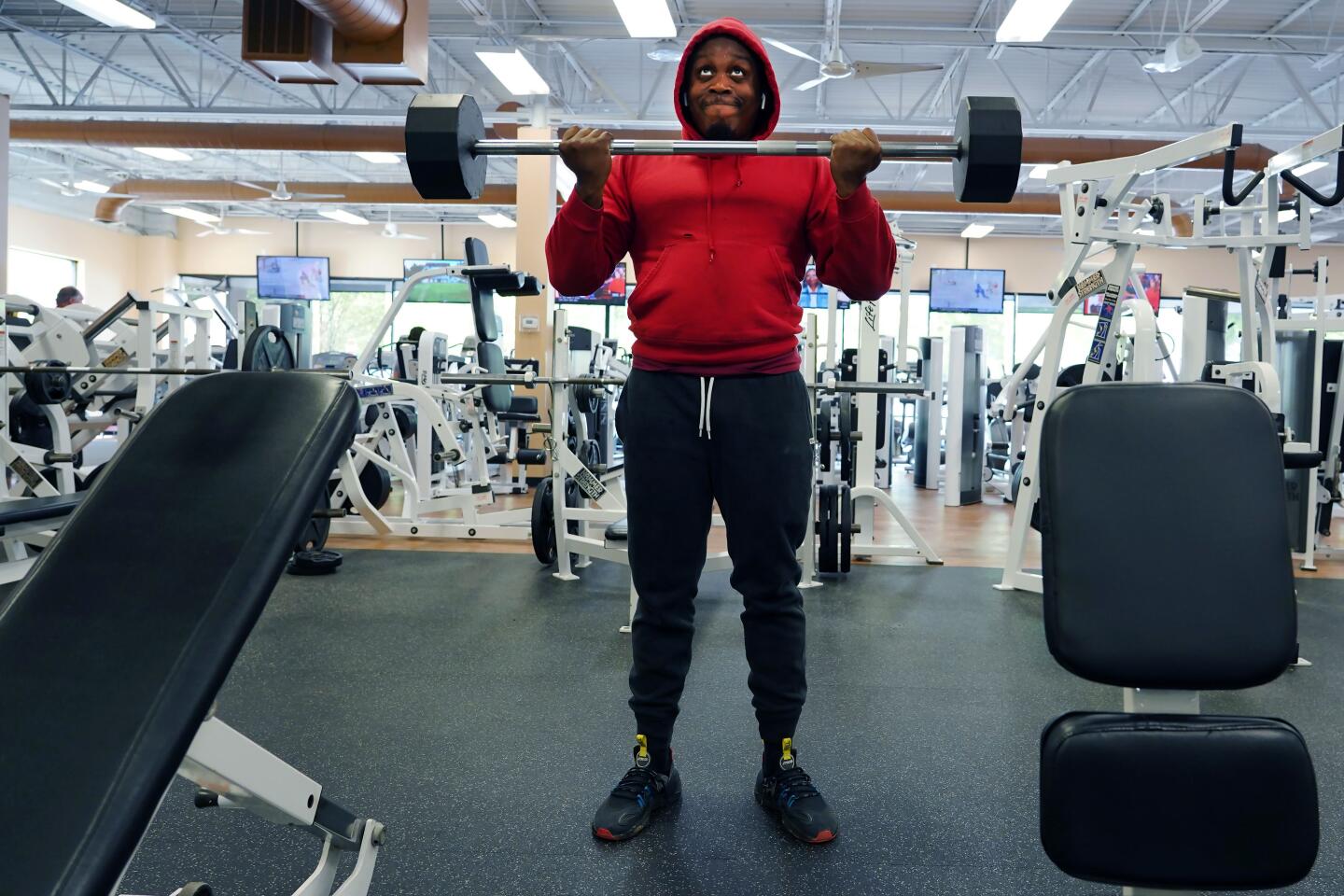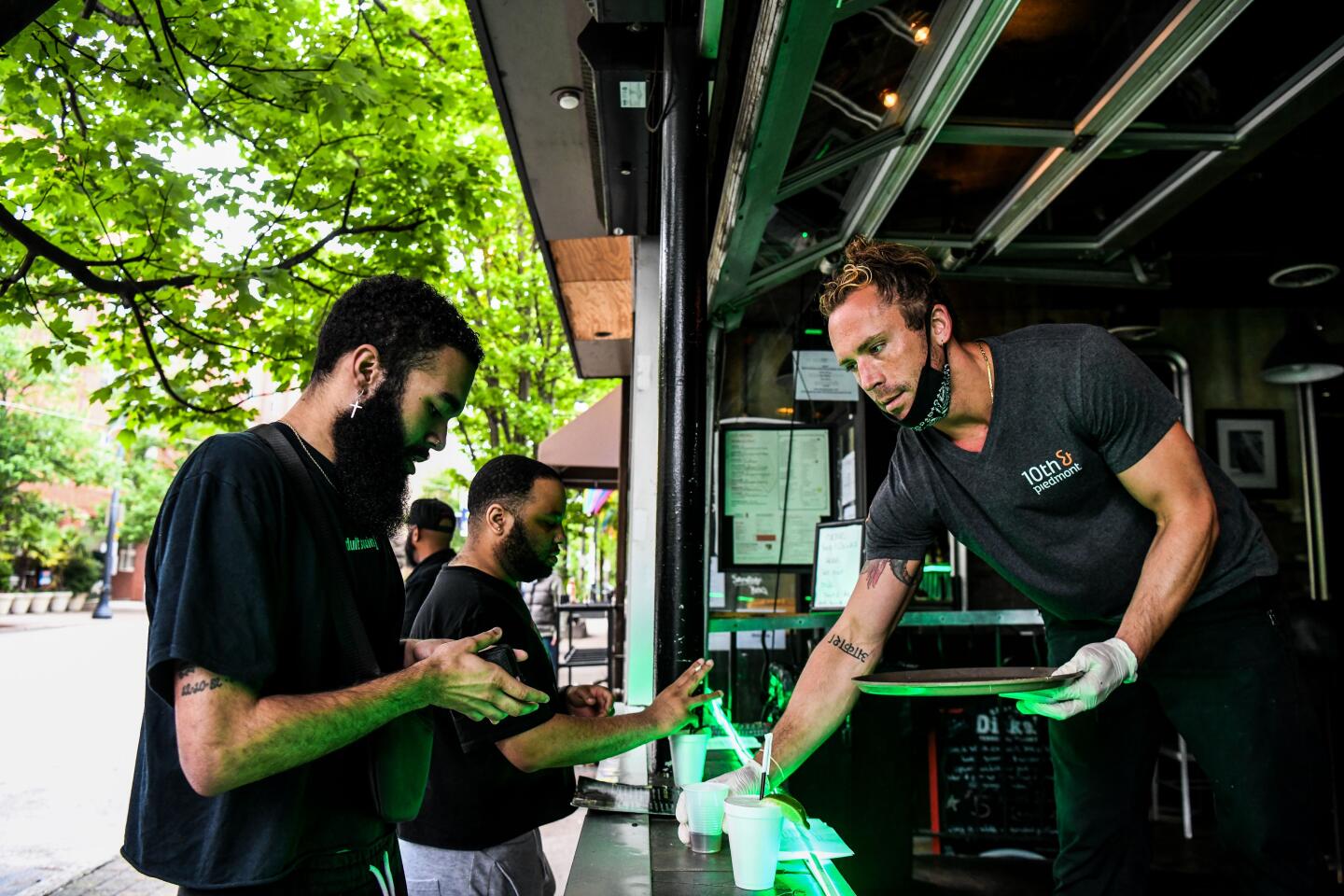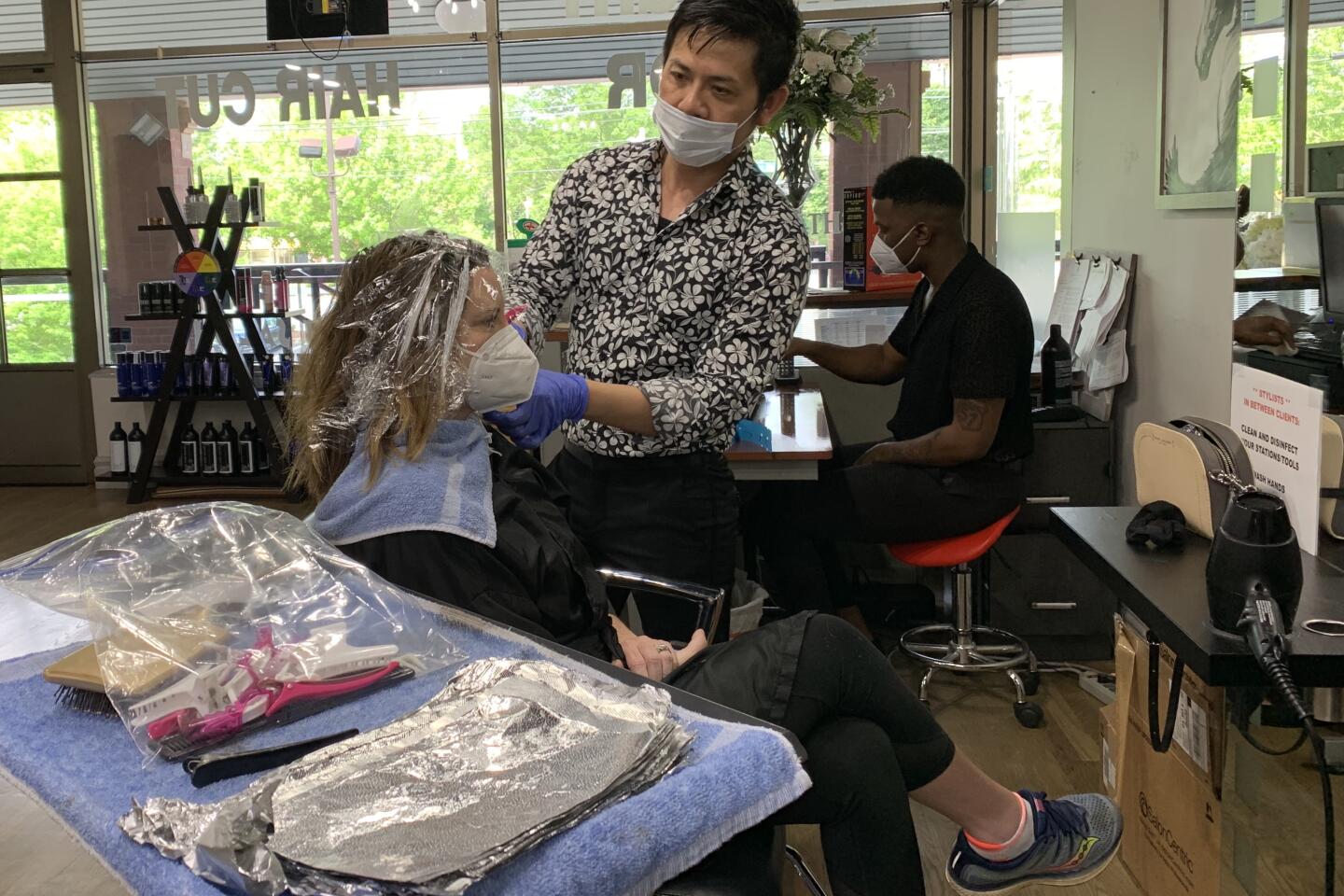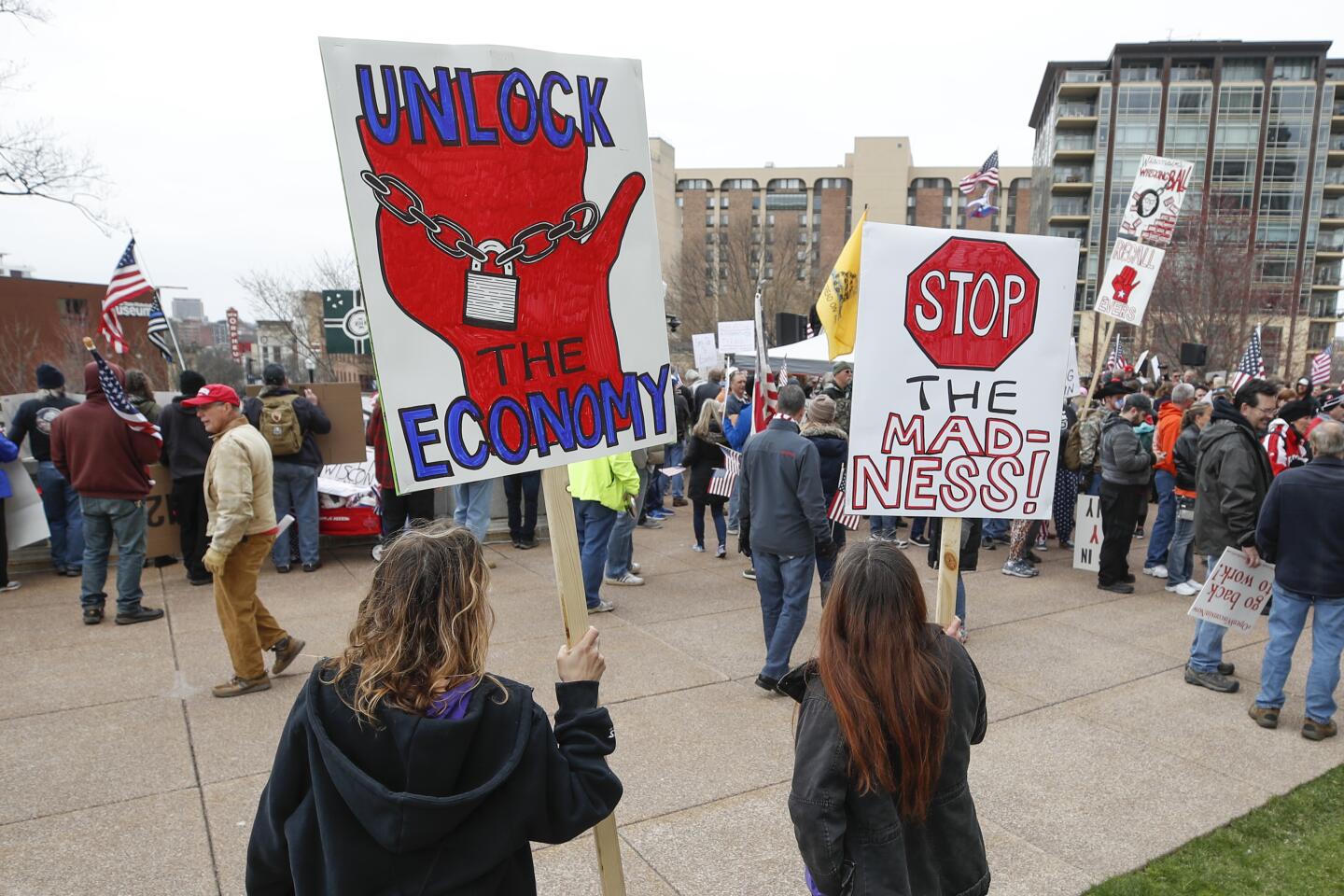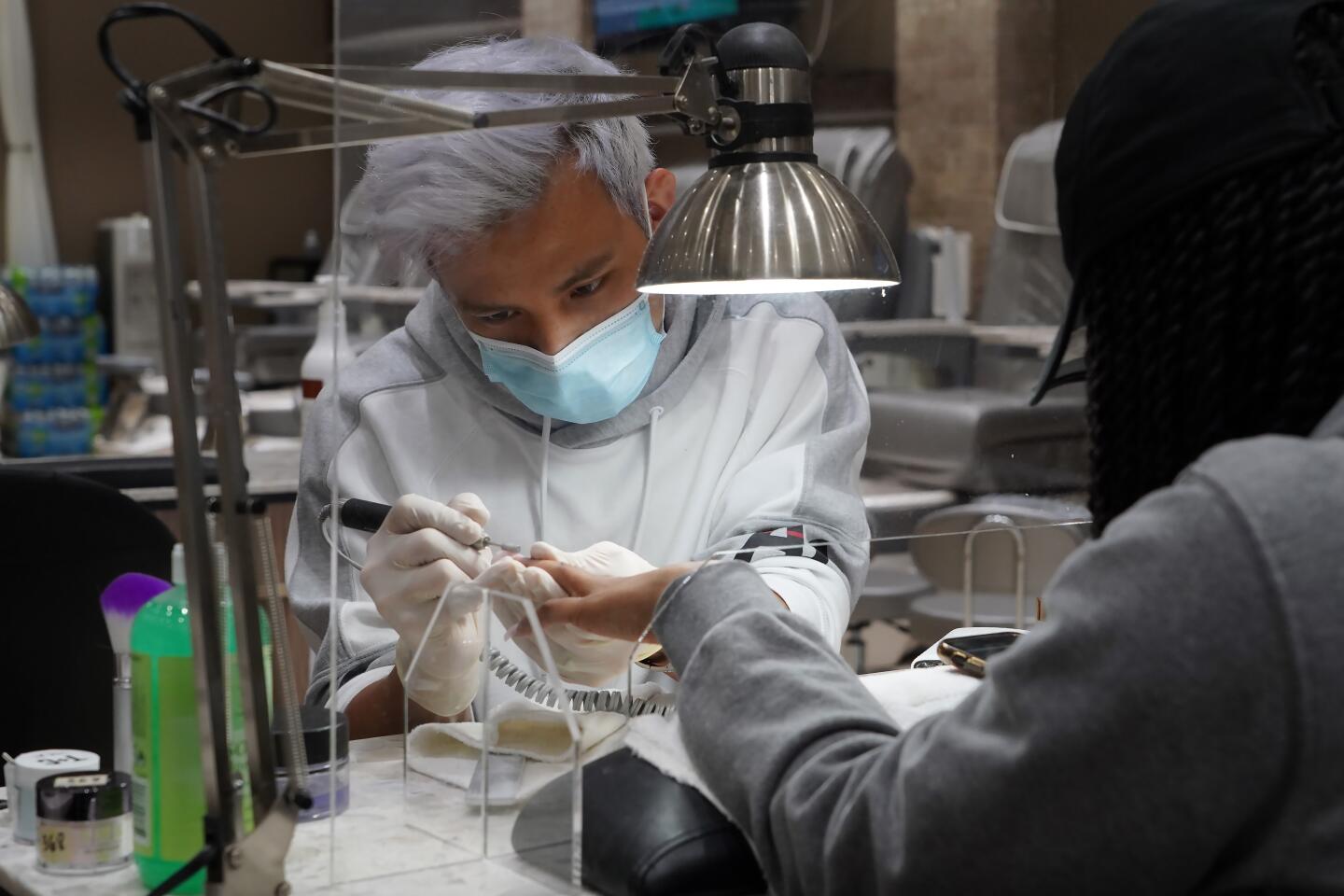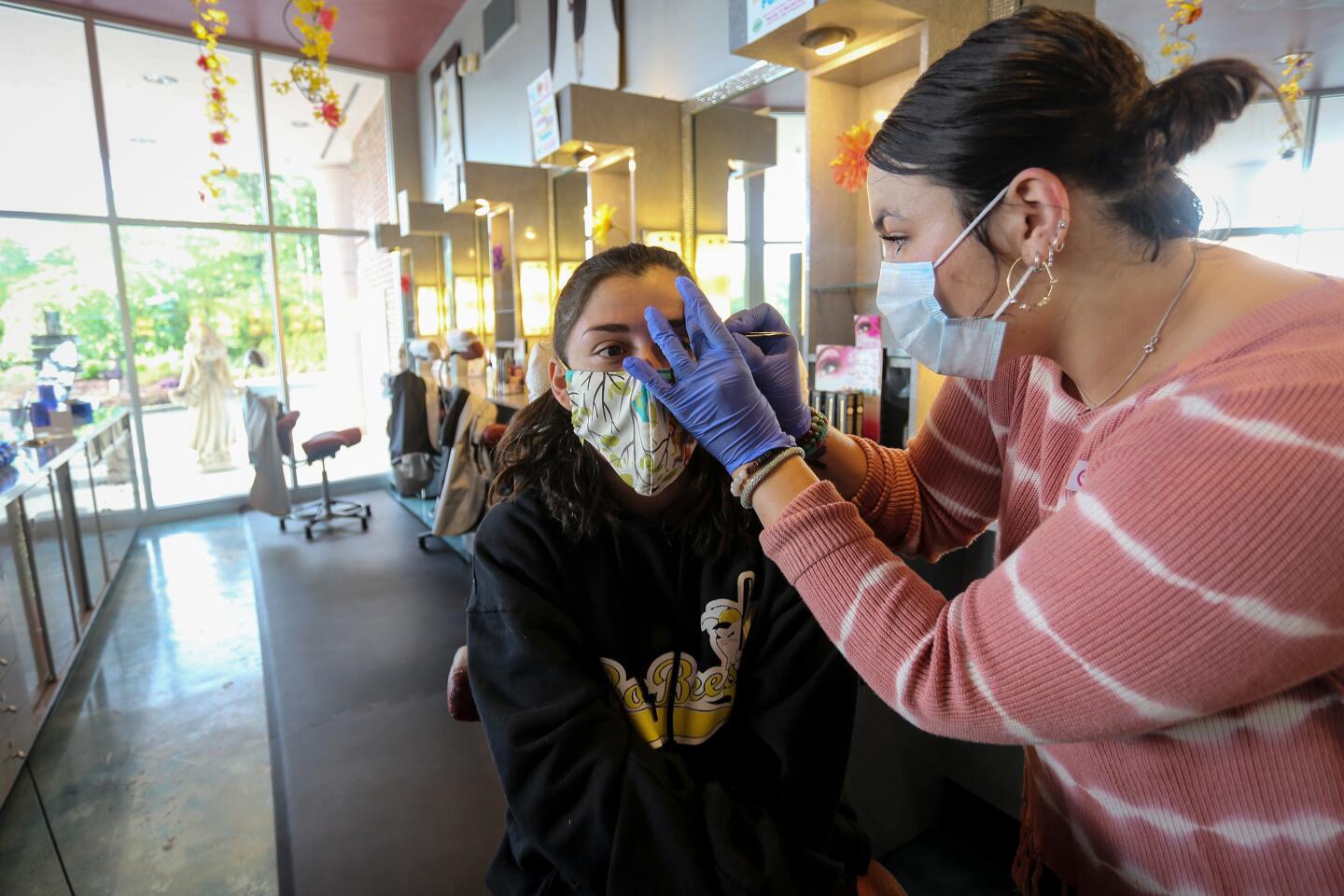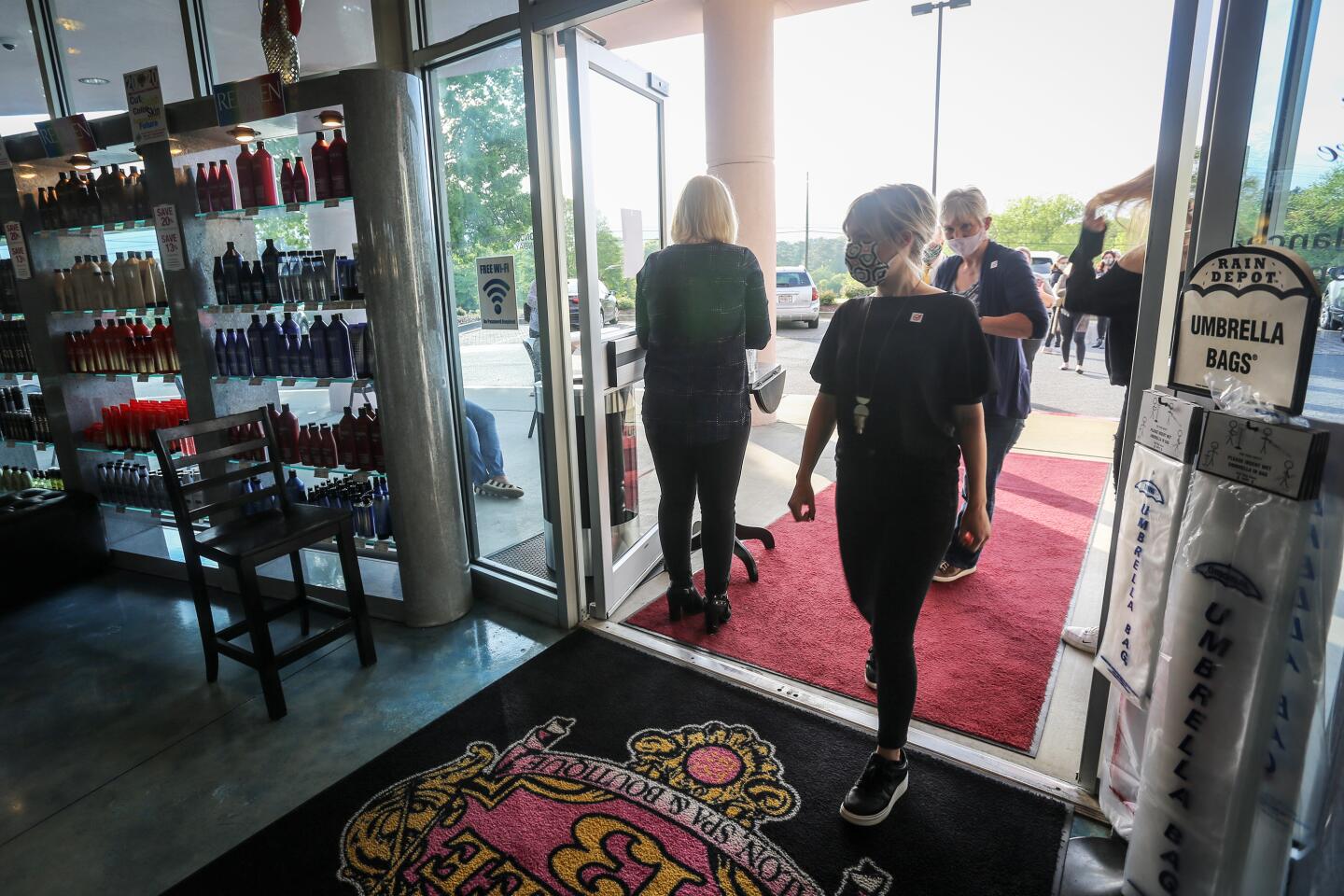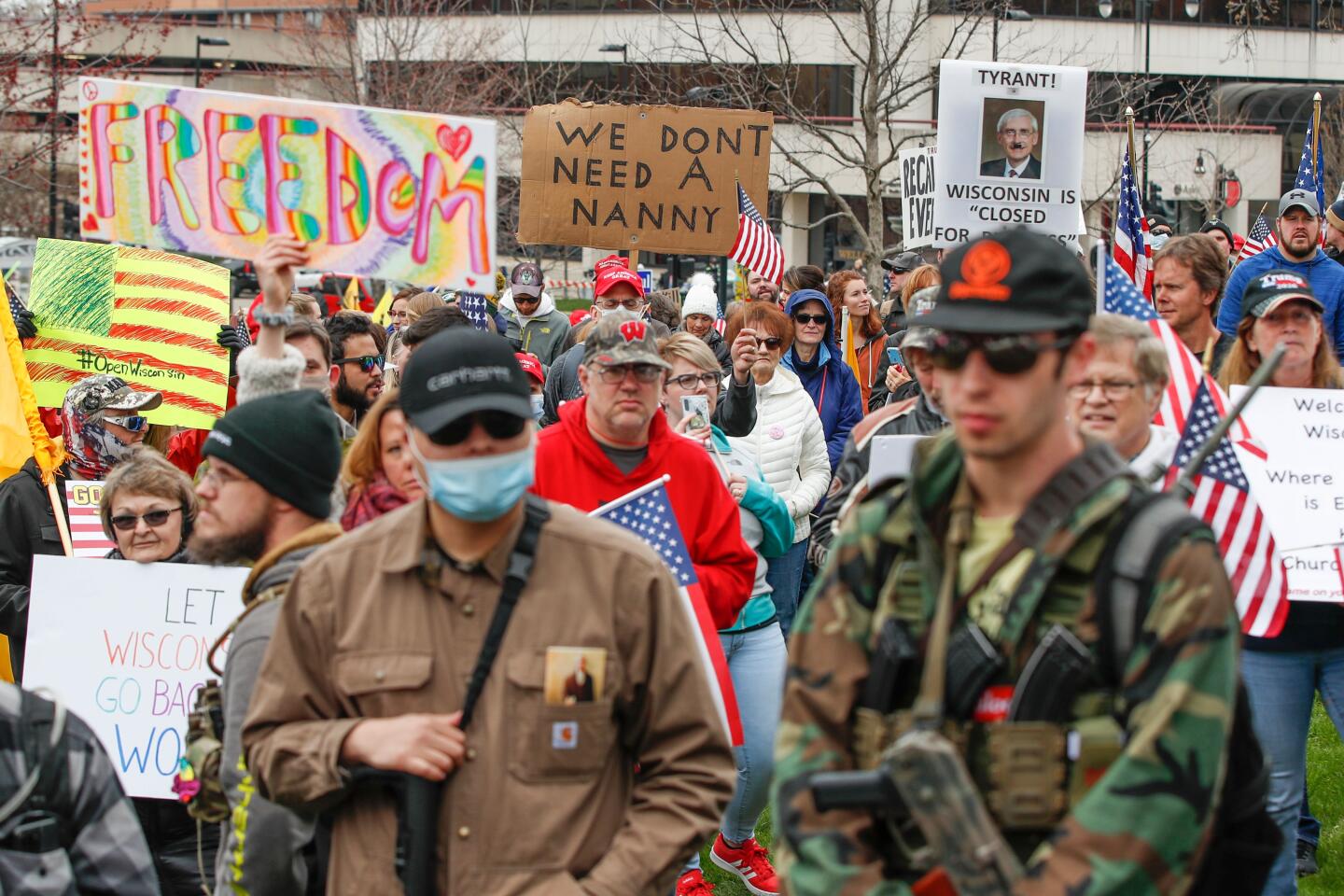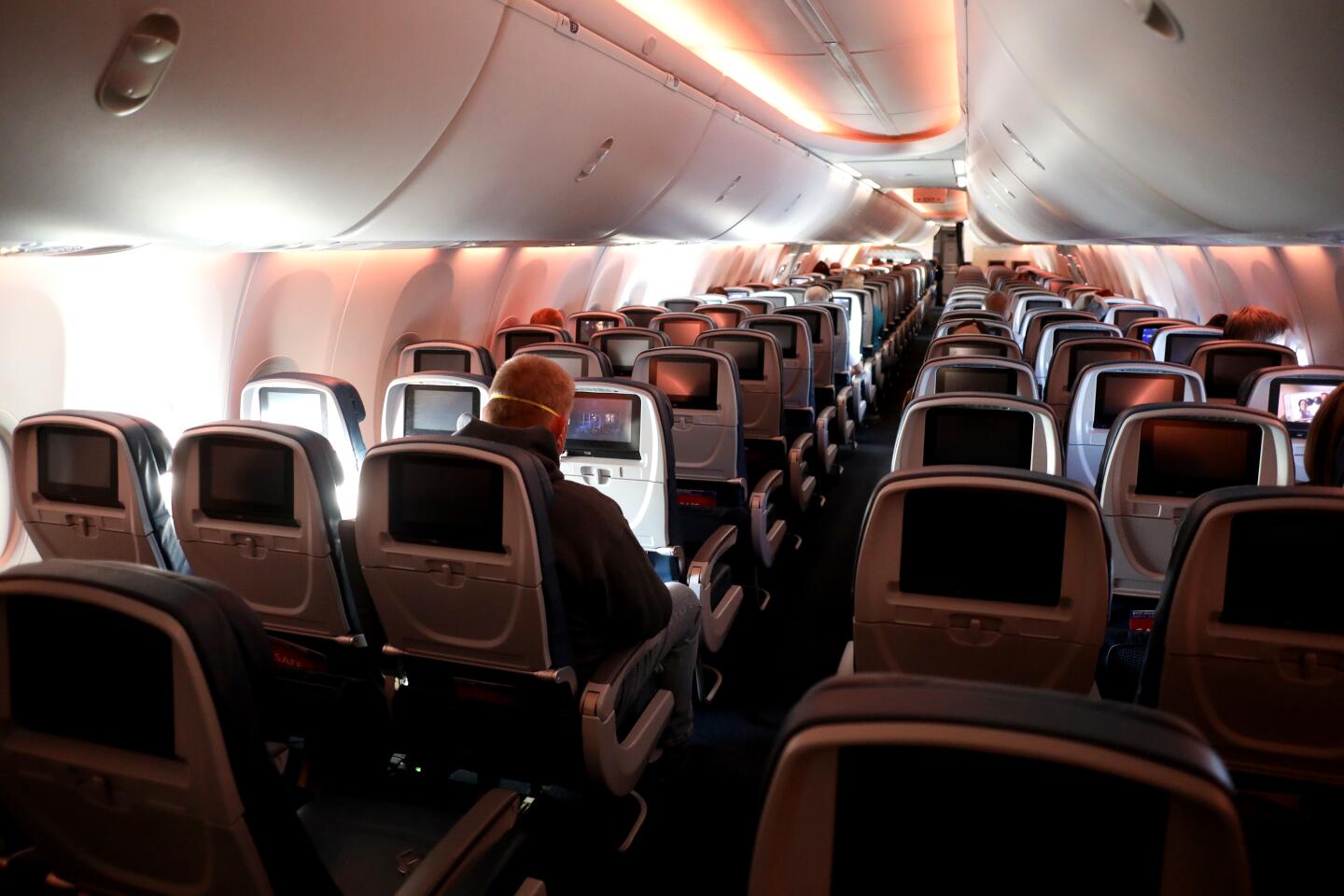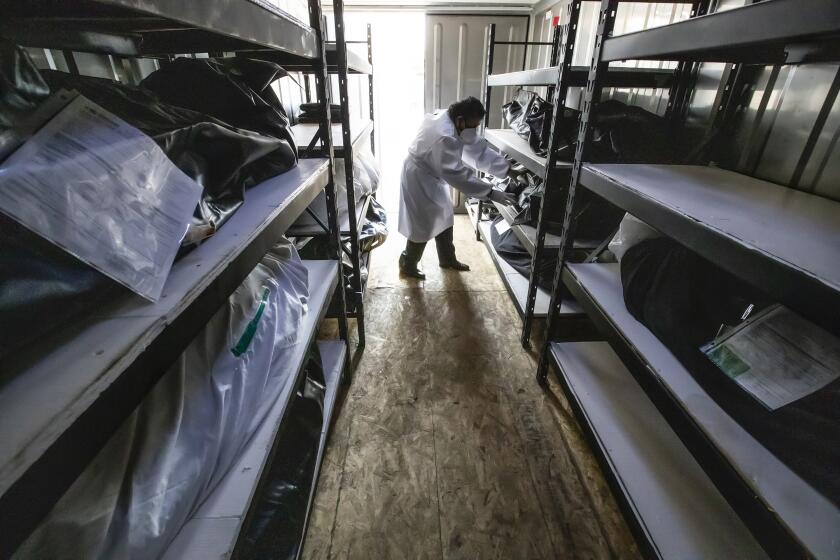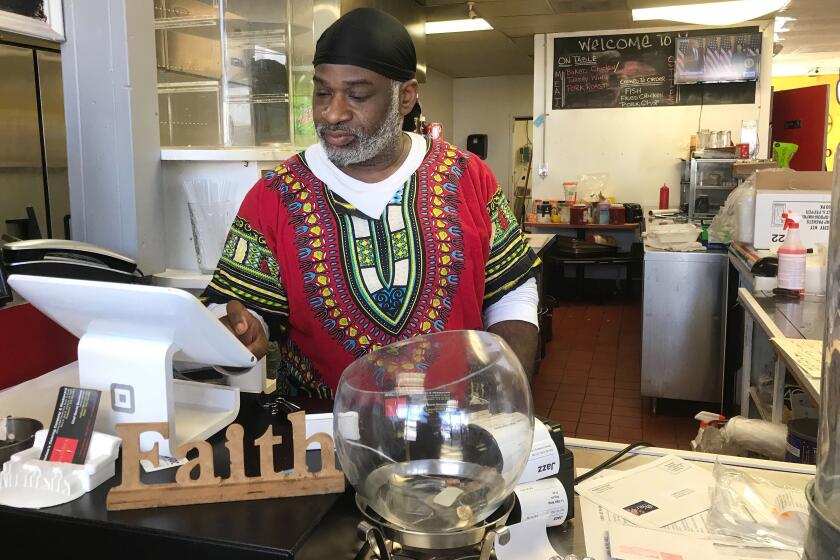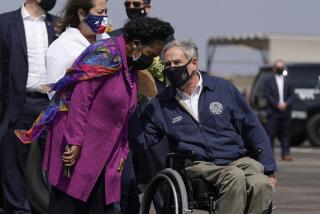States reopen theaters, restaurants amid coronavirus outbreak as experts warn of second wave
- Share via
HOUSTON — Millions of people across the U.S. were able to venture out to movie theaters, retail stores, restaurants and other businesses on Friday for the first time in weeks as governors in several states allowed stay-at-home restrictions to expire.
In Texas, an executive order from Gov. Greg Abbott allowed many retail stores, restaurants, malls and movie theaters to reopen at 25% capacity amid the coronavirus outbreak, and retailers in some rural counties to open at half capacity. In Houston, some bistros remained shuttered, but others opened to patrons standing in line outside doors posted with a request that they wear masks.
In Utah, restaurants and salons and gyms also opened with some restrictions. Other states, including Idaho, Maine and Tennessee, also eased restrictions, some over the objections of local leaders.
But governors in states extending or expanding their orders in the face of rising death tolls from the pandemic continued to face pushback and protests amid skyrocketing unemployment rates. In California on Friday, hundreds of protesters converged on Huntington Beach and the state Capitol in Sacramento to demand an end to stay-at-home orders and beach closures.
In Michigan, hundreds of protesters, many carrying assault-style weapons and wearing body armor, entered the State Capitol on Thursday night, demanding Gov. Gretchen Whitmer end stay-at-home orders.
Friday morning, President Trump tweeted that the protesters were “very good people” and that Whitmer should compromise.
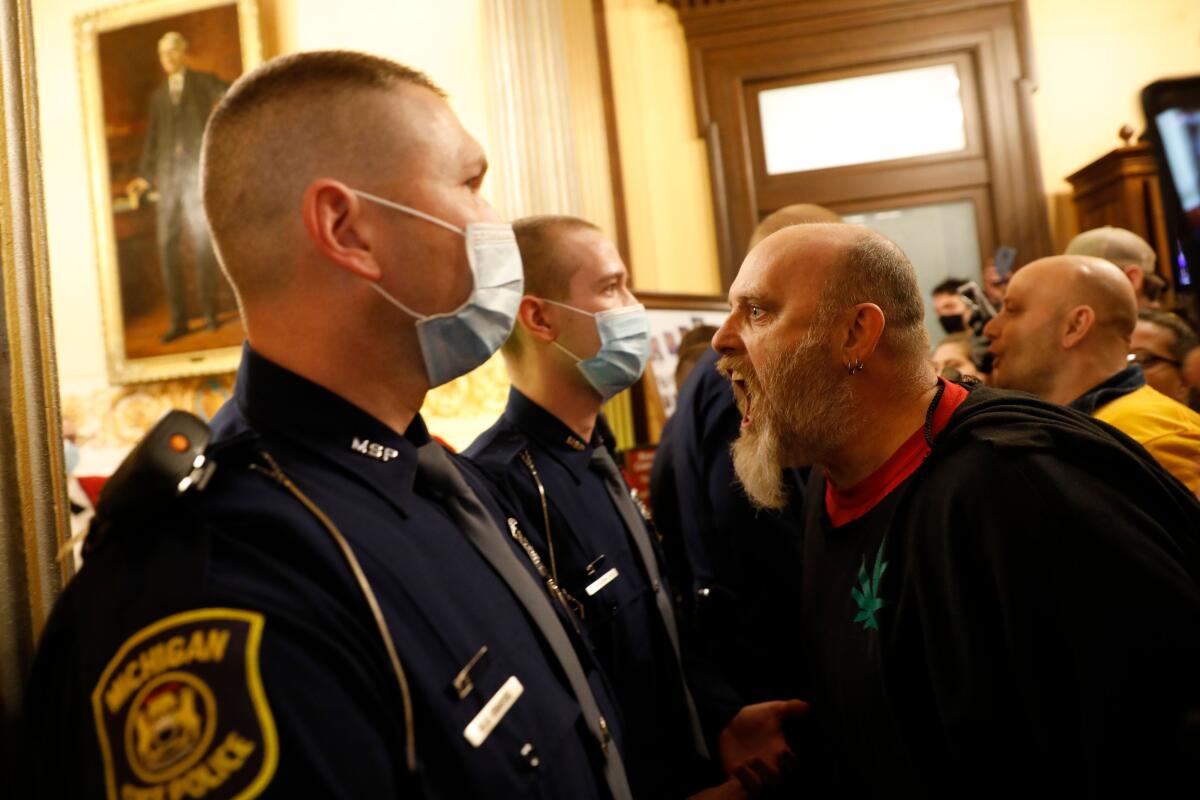
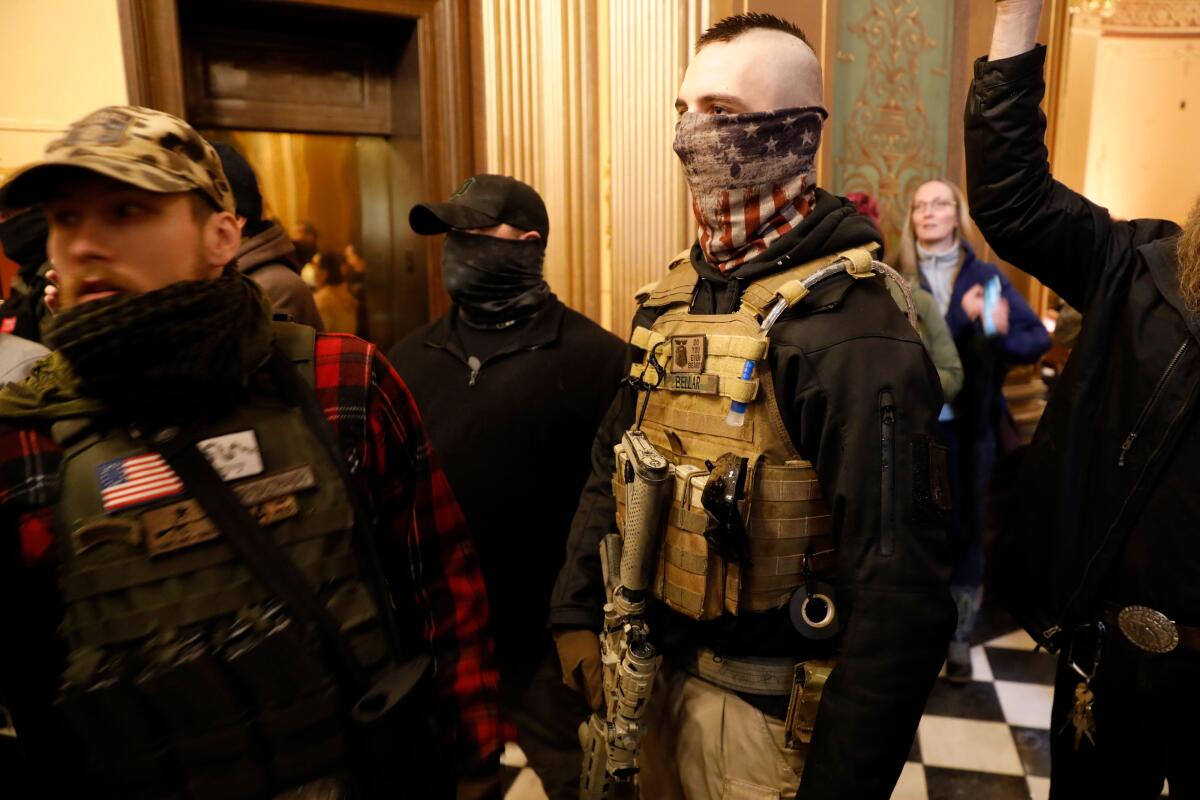
“The Governor of Michigan should give a little, and put out the fire,” Trump said on Twitter. “These are very good people, but they are angry. They want their lives back again, safely! See them, talk to them, make a deal.”
Whitmer said Friday that her stay-at-home order would extend through May 15, but signed a new executive order loosening some restrictions. Some businesses — primarily those involving outdoor work— will be allowed to resume operations starting May 7, including construction, real estate and forestry businesses.
The discord over stay-at-home orders comes as the number of confirmed coronavirus cases in the U.S. surpassed 1 million this week. On Friday, the death toll from COVID-19, the disease caused by the novel coronavirus, climbed past 64,500, according to Johns Hopkins University.
The decentralized process of reopening the economy has led health experts to warn of a second wave of coronavirus cases, particularly since some of the states reopening parts of their economies have not had consistently declining numbers of confirmed cases. Federal guidelines for easing restrictions recommend there be a 14-day decrease in cases, improved testing and a return to normal conditions in hospitals.
The U.S. death toll — 200,000 — from the coronavirus has passed the total from WWI and the Vietnam War combined. Here’s a look at COVID-19’s place in history.
“There are some states, some cities, kind of leapfrogging over the first checkpoint,” Dr. Anthony Fauci, director of the National Institute of Allergy and Infectious Diseases, said Thursday on CNN. “And, I mean, obviously you could get away with that, but you are making a really significant risk.”
Meanwhile some states have decided to reopen their economies in stages.
Pennsylvania Gov. Tom Wolf said 24 mostly rural counties will begin to reopen May 8, though gyms, barber shops, nail salons and theaters will remain closed. The most heavily populated areas, including Philadelphia and Pittsburgh, will remain locked down, Wolf said.
Maine Gov. Janet Mills allowed certain businesses — including barbershops, hair salons and drive-in movie theaters — to begin reopening Friday under strict guidelines. Golf courses and marinas were also cleared to open and churches can now offer drive-in services.
A week after Georgia Gov. Brian Kemp plunged Georgia into the middle of a national social experiment — rolling back restrictions on businesses in an effort to restart the economy after a monthlong shutdown to halt the spread of COVID-19 — some restaurants, salons and tattoo parlors remain shuttered. Most that are opening are proceeding cautiously.
New Mexico Gov. Michelle Lujan Grisham, who is starting to ease a few restrictions including on golf courses and veterinary clinics, temporarily locked down the city of Gallup Friday in order to slow a spike in infections. Businesses in Gallup must close between 5 p.m and 8 a.m., and drivers will only be allowed to have one passenger in their car. All roads into Gallup will also be closed.
But Grisham noted that because in most of New Mexico, residents’ actions had begun to “flatten the statewide curve,” the state will gradually lift restrictions, allowing for partial reopenings of nonessential businesses, including some retailers that can offer delivery and curbside pickup.
“These changes do not make our fight against the virus any easier; in fact, New Mexicans’ obligation to our social contract only deepens as we enter the next phase,” Grisham said.
In New York, by far the state hardest hit by the pandemic, Gov. Andrew Cuomo announced that schools would remain closed for the remainder of the academic year. He made the announcement after 289 New Yorkers died in the 24-hour period ending Friday. He said that was down from 306 deaths the day before. The rate of hospitalizations continues to fall, he said. Nearly 24,000 people in New York have died from COVID-19, according to Johns Hopkins.
New York City Mayor Bill de Blasio announced Friday that the city will open 40 miles of streets this month to pedestrians in a bid to encourage social distancing as the weather warms up. De Blasio said May will be a decisive month in the city’s battle to slow the spread of the coronavirus.
The mayor criticized governors who are lifting restrictions.
“There are some other parts of the country that have not focused on the evidence as part of reopening, and I hope and pray that it doesn’t backfire and that the government in those states don’t act in a hasty manner,” de Blasio said. “We are not going to let that happen here.”
In Texas, where more than 800 people had died of COVID-19, Common Bond Bistro & Bakery in Houston had a line of customers waiting to enter at 8 a.m. Friday.
They sat six feet apart at tables inside and on the patio. Many of the restaurant’s 30 staff returned to serve them, getting their temperatures checked beforehand, but a few stayed home, general manager Claudette Cote said.
“If they’re uncomfortable to come back to work, I respect that,” Cote said as she stood outside wearing a cloth mask.
At nearby Empire Café, Antonio Otero sat on the patio celebrating a friend’s birthday. Otero, 28, who works as a server at another restaurant, said he understood why some of his co-workers chose not to return to work this week.
“I don’t think it’s necessarily the smartest thing to reopen,” Otero said.
Sitting at another table more than six feet away, nursing student Diane Blair disagreed.
“At some point, we all have to learn new rules of engagement,” said Blair, 47. “As long as you take proper precautions, I think we can safely evolve until we have some sense of normalcy.”
The Associated Press contributed to this report.
More to Read
Sign up for Essential California
The most important California stories and recommendations in your inbox every morning.
You may occasionally receive promotional content from the Los Angeles Times.
